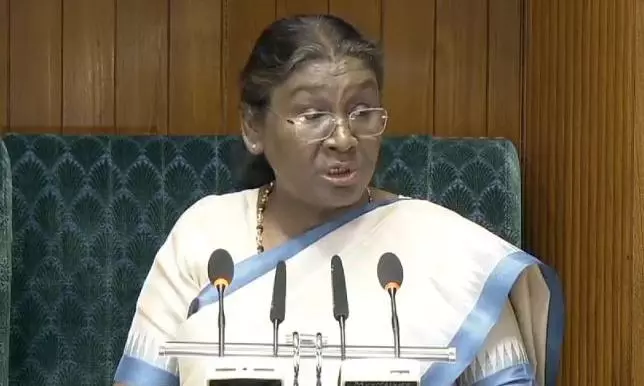President Murmu Urges Courts to End 'Culture of Adjournments'

New Delhi: Calling the pendency of court cases a big challenge, President Droupadi Murmu on Sunday said that efforts need to be made to change the "culture of adjournments" in courts to ensure swift justice.
Addressing the valedictory event of the two-day National Conference of the District Judiciary organised by the Supreme Court, the President said common people's stress level increases in courtroom settings and this needs to be studied.
"All possible efforts need to be made to change the culture of adjournments in courts," she said, adding that all judges of the country have the responsibility to protect justice.
The President said that the poor people from villages are afraid to go to court. They become participants in the justice process of the court only under great compulsion. Often they tolerate injustice silently because they feel that fighting for justice can make their lives more miserable. For them, going away from the village to the court even once becomes a cause of great mental and financial pressure. In such a situation, many people cannot even imagine the pain that poor people experience due to the culture of adjournment. Every possible measure should be taken to change this situation, she said.
The event, organised by the Supreme Court, was attended by Chief Justice of India D.Y. Chandrachud and Union minister of state for law and justice (Independent charge) Arjun Ram Meghwal. Ms Murmu also released a flag and insignia of the Supreme Court during the programme held at the Bharat Mandapam here.
While addressing the event, Mr Meghwal called for collective efforts to break the common perception that the justice delivery system in India suffers from "taarikh pe taarikh culture" and asserted such efforts will strengthen the trust factor among citizens.
Proposing a critical analysis of “ageing of pending litigation”, the law minister said, "It is the collective responsibility of all those present at the programme to break the common perception that the justice delivery system has a taarikh pe taarikh culture."
Expressing concern over the fact that only 6.7 per cent court infrastructure at the district level is female-friendly, Justice Chandrachud said, "We must without any question, change the fact that only 6.7 per cent of our court infrastructure at the district level is female-friendly. Is this acceptable today in a nation where, at the basic level of recruitment in some states, over 60 or 70 per cent of the recruits are women?"
"Our focus areas are on increasing accessibility measures, which can be understood by carrying out infrastructural audits. Opening in-court medical facilities, creches and technological projects like e-seva kendras and video conferencing devices. These endeavours aim to increase access to justice,” the CJI said.
"Axiomatically, we must also ensure that our courts provide a safe and accommodating environment for all members of our society, particularly for groups such as women and other vulnerable groups such as persons with disability, members of the Scheduled Castes and Scheduled Tribes,and people across the socio-economic landscape," the CJI said.
In her address, the President said that since its establishment, the Supreme Court of India has made an invaluable contribution as a vigilant sentinel of the judicial system of the world's largest democracy. Indian jurisprudence has a respectable place because of the Supreme Court.
Ms Murmu said that the feeling of faith and reverence towards justice has been a part of our tradition. She referred to her address on a previous occasion and reiterated that people consider every judge in the country as God.
The President said: “Every judge and judicial officer of our country has the moral responsibility to respect dharma, truth and justice. At the district level, this moral responsibility is the lighthouse of the judiciary. The district-level courts determine the image of the judiciary in the minds of crores of citizens. Therefore, providing justice to the people through the district courts with sensitivity and promptness and at a low cost is the basis of the success of our judiciary.”
Expressing concern over pendency and backlog of cases as a big challenge before the judiciary, the President stressed the need to ponder upon the serious issue of cases remaining pending for as long as over 32 years.
The President said that there are many challenges before our judiciary, which will require coordinated efforts by all stakeholders to resolve them. For example, the judiciary, government and police administration should work together to find solutions to the issues related to evidence and witnesses.
The President said that when court decisions in a heinous crime like rape come after a generation has passed, the common man feels that the judicial process lacks sensitivity. It is a sad aspect of our social life that, in some cases, people with resources continue to roam around fearlessly and freely even after committing crimes, she said, adding that those who suffer from their crimes live in fear as if those poor people have committed some crime.
The President said that the children of women who are in prison have their entire lives lying ahead. Our priority should be to assess and improve what is being done for their health and education. Juvenile delinquents are also in the early stages of their lives. Taking measures to improve their thinking and mental health, providing them with useful skills for living, and providing them free legal aid should also be our priority, she said.
The President lauded the apex court decision to implement the provision of the Bharatiya Nagarik Suraksha Sanhita with retrospective effect. Under this, there is a provision to release first-time accused and those who have served one-third of the prescribed maximum imprisonment period on bail. She expressed confidence that by implementing the new system of criminal justice with this promptness, the judiciary will usher in a new era of justice.

